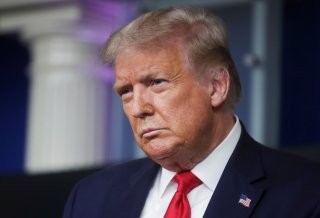The Case For Trump
Donald Trump isn’t the better choice to secure America’s future. He is the only choice.
The Democrats, on the other hand, bear at least as much responsibility for the political polarization and policy failures of the last four years as Donald Trump, and give the same impression as that of the Bourbons in 1815: they have learned nothing and forgotten nothing. They have not only allied themselves with, but become infiltrated by angry, left-wing radicals who demand nothing less than a fundamental transformation of America. Ironically, they are reminiscent of the early colonists who loved land and riches but also dreamed about building a new country of their own. They talk about their love for country, but it is not clear what exactly they love about American history, tradition, and the way it exists today—all of which they consider deplorable. The Democrats accuse Trump of being the president of division, yet Trump cannot compete with them when it comes to sorting Americans into different class and racial categories, creating preferences for some at the expense of others.
Reasonable people may disagree about the existence of systemic racism in the United States. Racism certainly still exists and should be condemned and addressed wherever found. Similarly, there is no question that there exists pervasive police brutality—most visible in the case of African-Americans but prevalent across the entire racial spectrum—because the very culture and training of police far too often put a premium on protecting the officers, even if it means not taking appropriate precautions to avoid hurting the innocent. This culture must be profoundly reformed, and those who cannot change should be purged from the ranks of the police.
At the same time, the left-wing increasingly dominant in the Democratic Party, however, want something much more basic. They do not simply want to reform the police; they want to defund and intimidate the police, all but ensuring that law enforcement officers are unable to take tough action against criminal acts, especially when the perpetrators emerge from minority groups.
No less dangerous is the popular notion that the only way to provide equal opportunities to African-Americans is to deliver special treatment such as affirmative action. Such a system entitles one to discriminate against the descendants of Holocaust survivors and Stalin's purges, of those who escaped communist brutality in East Asia, and millions of others who have absolutely no connection to slavery and have never benefitted from any form of racial discrimination. These are obviously complex matters, where people of goodwill can appropriately disagree in debating the facts and right responses. What is particularly dangerous, though, is a demonstrable totalitarian temptation among many in the left wing of the Democratic Party to create taboos about certain topics and to assume that in every dispute between protected and unprotected groups, the protected groups are presumed to be right by definition, whether they allege sexual harassment or accuse a white person of having a malicious intent in a dispute with an African-American. It is overwhelmingly conservative speakers who have difficulty sharing their views on university campuses and overwhelmingly people who depart from left-wing political correctness who are increasingly subjected, not just to public condemnation, but to economic sanctions and the total destruction of their good name and their career.
THE RECENT destruction of monuments—including Confederate statues—is the manifestation of a more general trend. America for many years was based on a realization that people have different views, backgrounds, and circumstances and are bound to disagree. Heroes to some look like villains to others, and clearly, there is a difference between keeping a statue of a historical figure and awarding them a Nobel Peace Prize. But there has always existed the idea that, in the name of national cohesion and mutual self-respect, we should accept—not necessarily celebrate or admire, but simply accept—historic symbols, important to a significant portion of the American population. That tradition of compromise and acceptance on which the United States was founded, and which, along with an entrepreneurial spirit and the rule of law, makes America great, is now under attack from left-wing groups closely associated with the Democratic Party.
In the field of foreign policy, the dominant tendency among Democrats today is a combination of overreach; blind commitment to allies, even if they are not part of an official alliance; selectively-applied democracy promotion, which gives the impression that the United States is in the business of worldwide regime change; and remarkable timidity when push actually comes to shove. As seen in Iraq, Afghanistan, and Vietnam, when the United States has to sacrifice real blood and treasure for this kind of indiscriminate global crusading, liberals are the first to lose their will to fight. There is nothing more fragile than an ambitious yet timid global empire, which has become an article of faith in the Democratic national security establishment. As the Ancient Roman historian Tacitus once observed: “Great empires are not maintained by timidity.”
Recall that in 1979, the Soviet Union appeared at the apogee of its power: it projected power worldwide, looked like a monolith at home, and provoked fear in the United States as potential hegemonic power. A little more than ten years later, the enterprise collapsed because of the great division among its peoples, conflict among its elites, and a pursuit of foreign policy objectives far beyond its means. If one observes American choices through this prism, Donald Trump isn’t the better choice to secure America’s future. He is the only choice.
Dimitri K. Simes, publisher of The National Interest, is president and CEO of the Center for the National Interest.

